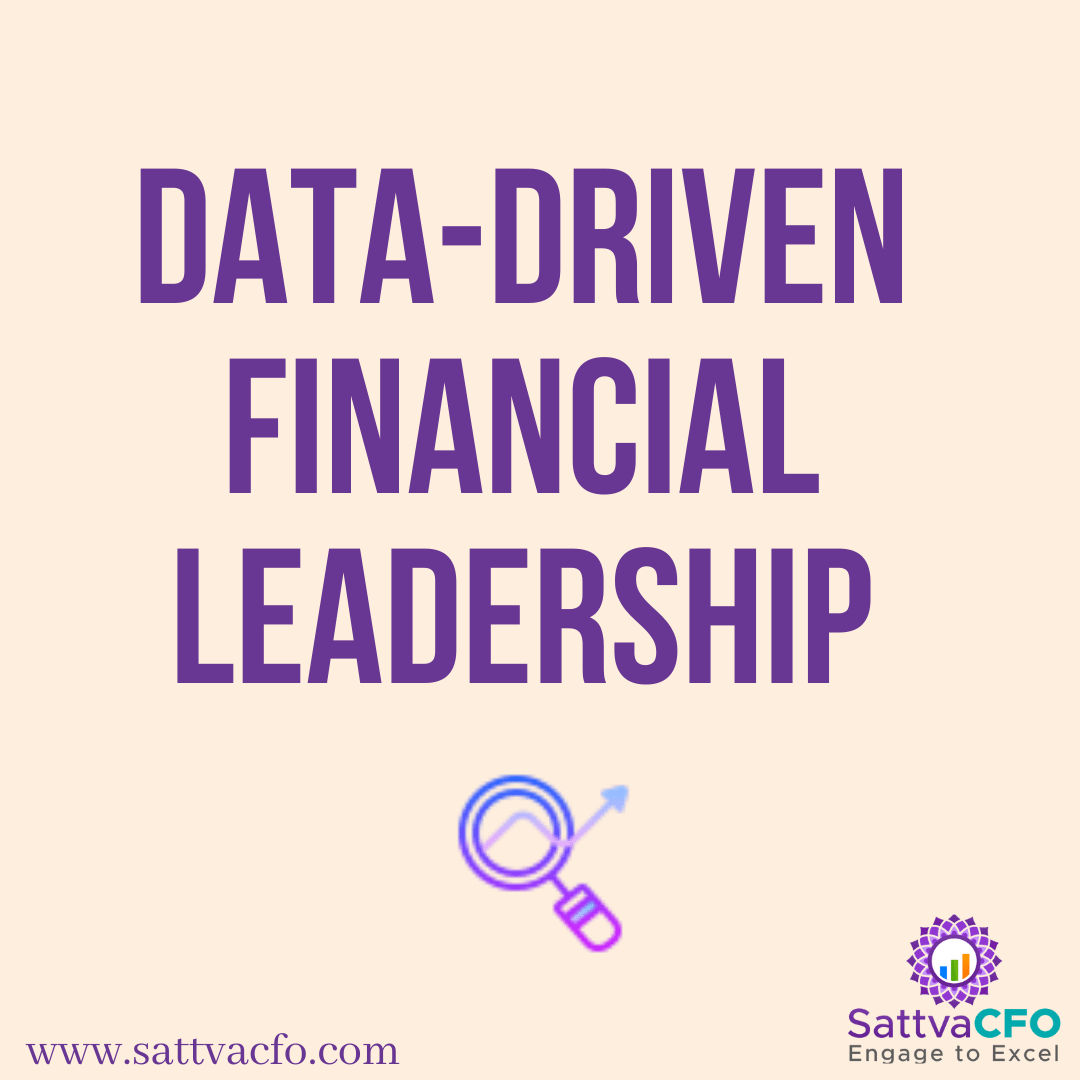Data-Driven Financial Leadership – Insight-driven CFO
The modern CFO is a strategic leader who leverages analytics to continuously monitor business performance, identify essential growth opportunities, and ensure that the firm allocates the appropriate resources to the suitable locations at the correct times. As such, modern CFOs want technology that provides real-time visibility into what is happening across all functions—they must be able to allocate resources more efficiently, measure performance and impact in real-time, and adapt strategy on the fly as conditions change. Articles elaborate on data-driven financial leadership, data challenges of a CFO, must for CFO stay ahead of the curve, insight-driven CFO.
The Chief Financial Officer’s (CFO) function is undergoing significant transformation. Competing financial priorities, growing pressure to maximize performance, and C-suite aspirations for strategic leadership redefine the chief financial officer’s vital yet ever-changing role. Simultaneously evaluating new and possibly disruptive financial networks and technologies such as Bitcoin and Blockchain, CFOs must continue to perform their traditional functions.
This requires CFOs to be diligent in adhering to ever-changing legislation, performing audits, offering insight into financial operations, and supervising firm assets. Additionally, if CFOs do not adequately manage risk and compliance issues, they risk suffering significant financial losses and irreparable damage to the brand’s reputation. Most importantly, a CFO must drive data literacy to remain competitive.
Table of Contents
What are the data Challenges a CFO faces?
In the finance department, data analysis is just as crucial as traditional accounting. Not only must the CFO analyze and monitor financial data, but they must also embrace business intelligence to identify patterns and trends in customer behavior. Extensive data analysis may provide an informative and accurate picture of an organization’s processes, systems, and performance. In-depth business intelligence can go even further by examining the influence of those processes and procedures on other aspects of the business, such as employee happiness, sales and marketing outcomes, and overall company performance.
Again, technological advancements are a great benefit; there are several tools available that assist in making sense of the deluge of data collected, avoiding potential overload and the risk of missing anything critical. A CFO must comprehend and utilize these instruments. With real-time data, patterns can be identified quickly and conveyed to those who need to know even faster, resulting in more rapid decision-making and more efficient planning and forecasting.
Holistic Financial Performance
The correlation between increased CFO strategic engagement and increased corporate performance is not coincidental. High-performing firms benefit from a chief financial officer with a broader business perspective and an integrated picture of the organization.
Timely & Accurate reporting
Financial information and analysis are critical for making sound business decisions, reviewing your company’s performance, enhancing economic performance, and ensuring you’re on track to accomplish your strategic goals. Financial data management is easier than you believe, but it is frequently not given the priority and emphasis it requires.
Quality of data
Financial services regulatory requirements have expanded dramatically over the last decade. Quality data gave by effective data governance, and data quality processes are critical in this setting for achieving effective compliance reporting, assuring accurate reporting, and enhancing business decisions that rely on quality data. Insufficient data has numerous consequences for the company, frequently impairing management’s confidence in the organization’s data. As a result, opportunities are lost. Losing the ability to obtain competitive insights results in revenue loss in a variety of ways.
Economic & Environmental uncertainty
The current situation has created uncertainty that pandemics have created, never envisioned earlier. Most countries face uncertain environmental & local regulations. Cumulatively, this made the operational & strategic plan irrelevant.
How to overcome the data problem?
Fortunately, advancements in data technology are increasingly altering the playing field. Rather than manually pulling data from various sources, stitching it all together, and then upgrading the data model as the business develops and evolves, it is now feasible to extract transaction-level insights across any data sources without requiring the data to be moved or transformed. As a result, better insights and increased visibility are supplied far faster and at a fraction of the expense previously associated with them. CFOs and their teams can operate lean while still adding value and have a more significant material impact on the business.
How can a data-empowered CFO drive results?
The CFO’s role has evolved from a financial control center to a more strategic nature, driving innovation and transforming the business to adapt to rapidly changing market conditions. Globally, data-driven chief financial officers bridge the divide between strategic decisions such as pricing and cost structures. CFOs who are data-driven must direct organizational efforts toward validating and cleaning the data. Cleaning, conforming and validating data can be accomplished by comparing data from various systems – for example, contracts, provisioning, and customer success – to identify missing, inconsistent, or repetitive data.
Driving Best Practises
It can be challenging to understand the ramifications of each strategic growth move, whether measured by the increased top line, bottom line, or shareholder wealth. However, the capacity to think strategically and offer actionable insights to drive growth has repositioned the CFO. To sustain top-and bottom-line development, businesses must prioritize not just plan design but also strategy execution. With both, modern CFOs have evolved into active business partners, rather than simply delivering statistics or passively advising.
Invest in Technology
Financial businesses adopt a forward-looking mindset when they make data-informed decisions. CFOs acquire a deeper understanding of their business drivers, enabling them to take proactive measures to improve business outcomes. Additionally, this data-driven strategy enables CFOs to envisage new opportunities that cross-business and IT, resolving financial information issues and developing a path for ongoing progress. Additionally, utilizing data for analytics allows CFOs to make more informed financial and operational decisions.
Attract & Retain High-Performance Team
In today’s fast-changing environment, CFO must attract a high-performance team to remain competitive. Further, CFO must engage with the team and continuously build their learning curve. It is also important to retain a qualified and experienced team, especially during a tough hiring environment.
Instill Business Agility
CFO must drive financial agility through insight drawn from a huge repository of data available at his disposal. He must drive a business-centric culture within the finance team and emphasize the importance of valuable insights to concerned stakeholders.
Benchmark against best processes
It is essential to benchmark the organization against the best processes and identify the strategies that are best suited for automation. CFO should prioritize automation for operations with a high rate of errors committed.
Further, constant evaluation is required to build robust control to drive performance and reduce risk.
Why must CFO stay ahead of the curve?
With Chief Financial Officers becoming dynamic, strategic decision-makers, they must become more proactive and embrace innovative technologies to keep their firms ahead of the curve in terms of cost control and optimization. CFOs already have access to a wealth of corporate data as a result of their job description. As a result, it makes perfect sense for them to take on greater strategic decision-making responsibilities. CFOs are rapidly transforming into strategists; they spend less time compiling and analyzing historical expense reports and more time advising on future investment decisions. Data-Driven Financial Leadership, insight driven cfo, data challenges of a cfo, cfo stay ahead of the curve.
Data-driven CFO delivers High-Value Results
A data-driven CFOs gain near-real-time access to financial and non-financial data for high-value business outcomes such as:
- Strategic sourcing optimizes vendors and suppliers.
- Ensure consistency of metrics, promote best practices, and increase yield across all plants and facilities.
- Determining the end-to-end supply chain’s financial performance at the granular level and identifying possibilities to improve efficiency and optimize expenses.
- Improving product flow to satisfy consumer demand.
- Increasing the productivity of assets.
- Simulating the effect of company actions on financial viability.
- Accelerating the integration of mergers and acquisitions.
FAQ on Insight-driven CFO
What is Business Agility?
Business Agility refers to an organization’s capacity to compete and thrive in the digital era by rapidly responding to market changes and emerging possibilities through innovative digitally enabled business solutions.
Also read:





Leave a Reply